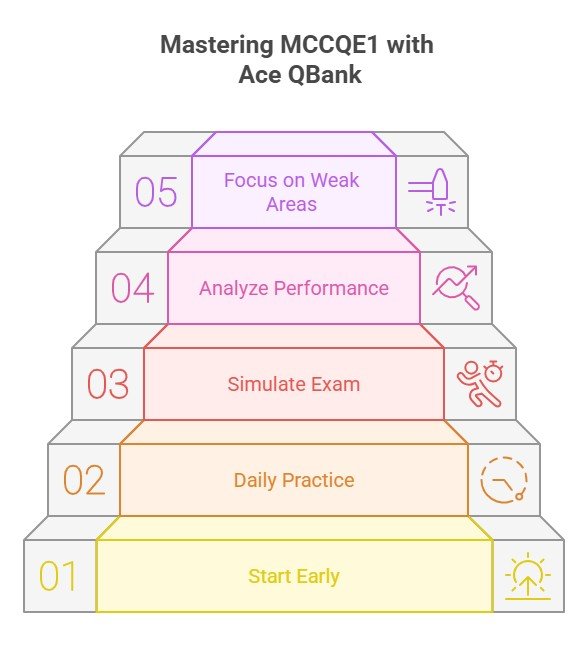How to Use Ace QBank Effectively for MCCQE1 ?

When was the last time you learned something unforgettable by simply reading it in a textbook? If you are anything like me. Real learning happens when you roll up your sleeves and dive into mistakes and gritty struggles, all of it.
Medicine is an ocean. Our best shot at swimming through it is by immersing ourselves right into the current. Here’s where question banks come in. A question bank is like your personal bootcamp. Pushing you, challenging you and showing you where you need to up your game.
In Canada, Ace Qbank is the most effective question bank for MCCQE1 exam preparation. In this post, we will break down why high-quality questions matter so much for MCCQE1. What sets Ace Qbank apart from other options? And how to make the most of its features to boost your MCCQE1 results.
What Matters Most for Successful MCCQE1 Exam Preparation?
The quality of practice questions is what sets strong candidates apart. This is one central element that can make or break your preparation.
High-quality, high-yield questions don’t just pepper your study sessions with information. They transform the way you think and learn.
Instead of rote memorization. You are challenged to apply clinical reasoning and critical thinking. In ways that truly mirror the complexity of the actual exam.
Think of each question as an opportunity. With each one, you are actively analyzing scenarios. Weighing options and making justifications for your choices.
Passive learning won’t work here. Tackling high-yield questions forces active engagement with the material. This is how long-term retention is built. Through active learning and not passive reading.
But it’s not just about doing lots of questions. It is about doing the right ones. Overly straightforward questions can give a false sense of confidence. Masking your knowledge gaps and leaving you unprepared for test day’s actual challenges.
High-yield questions invite you to confront your weaknesses. Exposing exactly where you need to improve. This targeted approach means your study time is always working for you. Every minute spent fine-tuning the skills and knowledge that matter most.
Another essential factor is alignment with the MCC objectives. Their published objectives are your exam’s blueprint.
The best question banks are built on this foundation. Ensure you are focusing on the concepts that are tested most frequently. And they are most critical for a competent physician.
The exam isn’t about chasing obscure facts. It is about mastering the core material that is essential for safe, effective patient care.
So, if you are wondering what matters most for MCCQE1 success. Let your answer be the deliberate and purposeful use of high-quality questions.
Your study time is precious. Don’t waste it. Investing in a superior question bank is the most strategic decision you can make. It is how you will sharpen your skills. Build unshakeable confidence and walk into the MCCQE1 ready to succeed.
Why Ace QBank Stands Out for MCCQE1 Exam Preparation?

Preparing for the MCCQE1 can feel like scaling a mountain in flip flops. You know you have the stamina and clinical knowledge.
But without the right training terrain you risk slipping. That’s where Ace QBank comes in. The question bank that transforms your study grind into a precision-engineered climb toward exam success.
From the moment you log in. You will notice the high-yield and clinically oriented questions. Questions that mirror the exam style and difficulty.
Each question is multi-step and rooted in authentic clinical practice. Instead of asking, “What is the definition of X?” you will wrestle with cases that demand you integrate pathophysiology, diagnostic reasoning and patient management. All in one sweep.
This approach not only mimics the exam’s cognitive demands but also cements deep connections between concepts. So you are thinking in clinical algorithms. Not just memorized bullet points.
Ace QBank for MCCQE1 Exam Preparation | |
Benefit | How it helps |
High-Yield Questions | Qbank questions are high-yield and challenging, designed to make you think deeply and apply learned knowledge. |
Evidence-based Medicine Explanations | In-depth explanations for correct and incorrect answers that teach underlying concepts, enabling the building of a solid foundation. |
Up-to-Date Content | Content is regularly updated to reflect the latest Canadian guidelines and changes in the MCC objectives list. |
Canadian Guidelines | Inclusion of Canadian practice guidelines, avoiding outdated or irrelevant content and improving exam readiness. |
MCC Objectives Alignment | Questions mapped to MCC objectives so you cover essential topics, and stay focused on high-yield areas for the exam. |
But challenging questions alone aren’t enough. The real magic lies in evidence-based explanations that accompany every answer choice.
When you miss a question, the Qbank doesn’t leave you hanging with a curt “Incorrect.” You receive a detailed walk-through of the rationale behind each option. Complete with current guidelines and practical clinical pearls.
This method propels you from rote memorization to genuine comprehension. For instance, you will understand why a beta-blocker is preferred over an ACE inhibitor in a hypertensive patient with heart failure. And you will retain that reasoning for years to come.
Medicine never stands still and neither does the question bank. The platform’s up-to-date content reflects the latest MCC objectives and evolving Canadian guidelines.
Whether it’s new hypertension recommendations or updates in cancer screening protocols. The Qbank’s editorial team ensures the material aligns with the most current standards.
You can study with confidence. knowing you won’t be blindsided by outdated recommendations on exam day.
Tracking progress is often the Achilles’ heel of self-directed study. The platform solves this with robust performance metrics. Beyond a simple overall score. You get granular feedback across 21 distinct categories.
You can pinpoint exactly where your strengths lie. And the areas that need your attention more. This personalized focus transforms how you study. Maybe you are excelling in cardiovascular questions but struggling with OBGYN topics.
With the platform-specific feedback. You can reallocate your energy to close those gaps. Enhancing your overall readiness for the exam.
Canadian-specific content is another hallmark of the Qbank’s superiority. Every aspiring Canadian physician knows the weight of staying aligned with Canadian guidelines.
The question bank ensures its questions and explanations are built on the framework of Canadian medical standards. Offering a level of accuracy and relevance that many other resources lack. This tight alignment ensures you are learning the right protocols for your future practice in Canada. Not generic international guidelines.
Most importantly, every question in the Qbank is mapped to the MCC objectives. These objectives delineate the competencies you must demonstrate on exam day. Therefore, aligning each question with a specific objective. Ensures comprehensive coverage of the list.
You won’t waste precious study hours on non-relevant topics. Instead, you will focus on the pillars of safe and effective patient care that the MCC deems most essential.
When you prepare for the MCCQE Part 1 exam. The stakes are high but so is the payoff. The question bank is a mentor that guides your efforts with purpose and precision.
It’s clinically oriented questions. Evidence-based explanations, up-to-date content and tailored metrics. All combine to create a resource that empowers you to study effectively.
The platform that strengthens your foundation and builds the confidence you need to succeed. Your ambition deserves the best question bank. Let the Qbank guide the way. And watch how your hard work transforms into well-deserved success.
How to Use Ace QBank Effectively for MCCQE1 Exam?

The key isn’t just using the question bank but using it strategically. A realistic study plan combined with what the question bank offers. It will transform your preparation and significantly boost your chances of success.
That’s because you have a state-of-the-art at your fingertips. Packed with high-yield questions and evidence-based explanations. Hundreds of visual aids that enhance retention and boost performance on exam day.
Let’s walk through a step by step guide to getting the most out of this powerful question bank.

Start Early and Build Momentum from Day One
The most common mistake candidates make is saving the question bank for the final, frantic weeks of review.
This approach treats practice questions as an assessment tool rather than a learning one. To use the Qbank effectively. You must start early and integrate it into your foundational learning.
For instance, after you cover a major topic in your primary study resource. Immediately turn to the Qbank. Create a targeted block of questions on that specific subject.
This practice is a powerful form of retrieval practice. The cognitive science principle that pulling information out of your brain is far more effective for long-term retention than passively putting it in (i.e., re-reading notes).
It also exposes knowledge gaps while the material is still fresh. All while beginning to build the mental frameworks needed for complex clinical problem-solving from day one.
Be Consistent and Daily Practice Question
Consistency is king. It trumps cramming every time. Your brain learns best through spaced repetition and steady reinforcement.
Instead of punishing yourself with a 200 questions marathon every Sunday. Commit to a manageable number of questions every single day.
Aim for 25–40 questions each day from 2900 MCCQE1 style questions. Treat this session as a fixed appointment in your calendar. This steady rhythm does two things.
First, it keeps you in a constant state of “exam readiness.” Preventing the rust that accumulates when you take long breaks. Second, it makes the monumental task of completing thousands of questions feel achievable and helps prevent burnout.
However, your daily practice must include a thorough review of every single question. Whether you got it right or wrong.
If you answered correctly. Confirm your reasoning was sound. Also, read the explanation other options to find out why they were incorrect. This will deepen your understanding.
If you answered incorrectly, dive deep into the explanation until you have an “aha!” moment. This review process is where the most profound learning occurs.
When you figure out why you answered wrong. You find gaps in your knowledge and learn how to avoid the same mistakes.
Simulate Exam Conditions
As you get closer to your exam date. Ideally, in the final 4-6 weeks. Your focus should shift to building stamina and mastering the clock.
The exam packs 230 multiple-choice questions. Giving you just over a minute per question. This requires not only knowledge but also mental endurance and pacing.
Use the Qbank’s exam simulation mode to create timed blocks of questions. Start with 40-question blocks in time study mode. Adhere strictly to the time limit. And immediately after submitting the exam. Review the analytic feedback.
This feedback will show you where you excelled. And where you need more practice. This process helps you develop time management skills. Test-taking strategy that is crucial during the actual exam.
In other words, this practice helps you:
- Develop an internal clock
- Build mental stamina
- Reduce anxiety
You will get a feel for how long you can spend on a tough question. Before you need to make an educated guess and move on. The simulation also builds your capacity to maintain focus under pressure.
Not to mention, familiarity breeds confidence. By replicating the test-day experience. You demystify it. Reducing the likelihood of performance crippling anxiety.
Analyze Your Performance
The platform’s performance metrics are your personal diagnostic dashboard. Ignoring them is like ordering a full set of labs for a patient and then never looking at the results. Your overall percentage correct is just a vanity metric. The real gold is in the details.
Dive into the analytics. The question bank allows you to track your performance across dozens of categories.
- Are you excelling in cardiology but struggling with obstetrics?
- Are you great at diagnosis but weak on management and therapeutics?
The data will tell you. These performance graphs provide an objective. Undeniable evidence of your strengths and weaknesses.
Use this information to guide your study plan. Focus on strengthening weak areas. Rather than only reviewing subjects you are already comfortable with.
Focus on Weak Areas
The Qbank allows you to target specific topics or competencies. Use this feature to zero in on weak areas. Weaknesses should excite you. They are a pathway to mastery.
So, why sweep mistakes under the rug? When you can shine a spotlight on them. Create a question block from those head-scratcher questions. The ones where you stumbled last time. Put them front and centre in your practice sessions. This isn’t about beating yourself up. It’s about owning your weak spots.
Here is the best part. Seeing those questions again and nailing the answer this time. Feeling like an absolute beauty. Now that boosts confidence!
The first stumble was just a stepping stone. The second round is victory. Each right answer chips away at self-doubt and improves your overall performance.
However, if you find yourself repeatedly missing the same questions. It might be time to revisit the underlying concepts.
Take a step back and review the foundational material. This approach ensures you truly understand the topic. Rather than just memorizing answers.
Because one thing is for sure and you can’t rely on rote memorization for the MCCQE1 exam.
How Can I Try MCCQE1 Sample Questions?

To access the free MCCQE1 demo questions. First, register for a free demo account. This gives you more than just sample questions. It provides access and hands-on experience to familiarize yourself with the platform.
This hands-on exploration. Giving you a chance to see how it can support your preparation in a meaningful way.
Once inside, you will be able to try out important features. Features such as flagging questions that you want to revisit later. And also highlighting key information within questions and explanations.
These tools are thoughtfully integrated to help you focus your study sessions. Making your learning more effective.
Additionally, the demo lets you create personalized question blocks. And select from different study modes including timed practice or tutor mode.
Sign up for the free demo and dive into the questions. Test the functionality of the platform. See how the Qbank can transform your study experience.
Special Tips for International Medical Graduates (IMGs)

For International Medical Graduates (IMGs) preparing for the MCCQE Part 1. It is an exciting and yet challenging journey. I know this exam means more to you than just a test. It is a critical milestone on your journey to practice medicine in Canada.
Passing the exam is a fundamental requirement for many IMGs. For both entering a Canadian residency program and securing licensure. However, with the right approach and the Qbank. You can confidently bridge gaps in knowledge and demonstrate your clinical competence.
Here are some game changing tips to help you shine in your MCCQE1 preparation.
- Master MCC Objectives with the Qbank
- Address Knowledge Gaps ASAP
- Don’t Underestimate Time Pressure
- Integrate Summary Tables and Flow Charts
- Track Your Progress Before Taking the Exam
- Master MCC Objectives with the Qbank
One of the greatest challenges for IMGs is adapting to Canada’s healthcare system. The healthcare which has unique practice standards and evidence-based guidelines.
The question bank is specifically designed to help you bridge this gap. With 2900 high-yield questions. It not only concentrates on teaching Canadian clinical standards. But also aligned with objectives set by the Medical Council of Canada (MCC).
Therefore, by consistently practicing through the Qbank. You will learn to interpret patient scenarios in the context of Canadian medical practices. Which is vital for both the exam and your clinical career in Canada.
The format of the questions mirrors the exam difficulty. And explanations are offering evidence-based medicine that directly correspond to the MCC objective.
These are invaluable features. Features that help you understand the objectives in the context of Canadian medicine. Ensures your success in the exam.
So, rather than passively reading the explanations. Actively engage with the material. And think about why a particular answer is correct or incorrect. And relate it back to the MCC objectives.
This proactive approach not only sharpens your clinical reasoning. But also ensures your success in the exam.
- Address Knowledge Gaps ASAP
Every IMG brings unique clinical skills and experiences. But there are often gaps in alignment with Canadian standards.
Use the Qbank as your ally in identifying and addressing these areas. The best part is that the platform has broken down all disciplines into unique 21 categories. Go through categories and start with the most difficult one.
Use the explanations provided in the question bank as a teaching tool. Many explanations are rooted in evidence-based practice. This directly aligns with the MCCQE1 blueprint.
So, dive deep into these explanations to uncover the “why” behind each concept. I am telling that passively reading through explanations won’t cut it. Particularly when the exam demands active recall and critical thinking.
Active engagement is the gateway to closing knowledge gaps and excelling on the exam.
- Don’t Underestimate Time Pressure
Time management is just as important as mastering the objectives. The exam consists of a morning session with 230 multiple-choice questions. And you have roughly one minute and thirteen seconds per question.
Many brilliant candidates stumble not because of a lack of knowledge. But because they run out of time. The exam is designed to assess your ability to think critically under pressure. A skill you will need in a fast paced clinical environment.
Therefore, start honing your time management skills early. You can do so in time mode to simulate the exam environment as you practice.
Adapting to the stringent time constraints is essential. Because it helps you to avoid losing points on otherwise straightforward questions. The earlier you start practicing. The more seamless the handling time pressure becomes.
- Integrate Summary Tables and Flow Charts
During your preparation, you will come across countless summary tables and flow charts. These are not just supplementary materials. They are powerful learning tools.
They built to distill challenging topics into simple and digestible visuals. Those that make it easier to understand and retain.
A well-designed flowchart can clarify a confusing diagnostic pathway. Far better than pages of text. A summary table can help you quickly compare and contrast different conditions. So, do not ignore them.
The key is to integrate these visuals into your daily review. Redraw them from memory and use them to solidify your understanding.
This will help you recall information quickly and accurately under pressure.
- Track Your Progress Before Taking the Exam
You cannot improve what you do not measure. From day one of your prep, you need a system to track your progress. Utilize the performance analytics in the Qbank to get a clear picture of your performance.
On the other hand, you know where you stand in advance. Believe me, knowing where you stand well in advance. It is a strategic advantage. Not only does it prevent anxiety and last-minute cramming. But also it lets you turn your weaknesses into strengths.
This is why you should take self-assessments seriously. These self-assessments for MCCQE1 will give you the opportunity to adjust your preparation. Help you enter the exam confidently and prepared. Knowing there are no surprises waiting for you.
Your journey as an IMG is one of incredible resilience and determination. With resources like Ace QBank and an emphasis on time management. You will position yourself for success in your medical career in Canada.
In the next section, I will share with you practical strategies. Strategies that help you stay motivated during your exam prep.
How to Stay Highly Motivated During MCCQE1 Exam Prep?

Last week, we discussed staying motivated throughout MCCQE1 exam preparation. It is as important as the study material you choose.
The key is making a study plan that fits you. Make no mistake, motivation is the fuel that ignites consistency. And consistency builds progress and success.
Start by setting clear and measurable goals. And swap vague intentions like “study more” for specific actions. Such as “Complete 40 cardiology questions by Thursday,” or “Master two ethics blocks this week.”
Setting and tracking these goals creates momentum. Turning overwhelming content into manageable wins. Those who create focused milestones are less likely to burn out and more likely to keep pushing forward.
Use a question bank that lets you tailor practice to your needs, like Ace QBank. It can transform how motivated you feel each day.
Focusing on weak areas is more efficient than undirected study. Because when you customize your question blocks to target weak areas. You are not just studying. You are also practicing critical thinking and problem solving.
This targeted approach boosts retention by up to 30%. And every time you see progress in a tough category, your confidence grows.
On the other hand, alternating between timed sessions and tutor mode keeps things fresh. Timed blocks help you build exam-day pacing. While tutor mode lets you dig into explanations and really understand why an answer is right or wrong. Mixing study modes is a simple way to stay engaged and maintain motivation.
The other thing is leveraging the mistakes. Mistakes are inevitable but what you do with them makes all the difference. Instead of brushing off wrong answers. Use analytics and redemption modes to dive deeper.
After each block, try to identify which of the following three it was:
- A knowledge gap
- A reasoning error
- Time-pressure mistake
Then, review the explanations carefully. Analyze where you went wrong. And repeat those questions on a spaced schedule until the concepts stick.
You have answered a question incorrectly for a reason. Finding out why you answered a question wrong alone can lead to a 25% jump in scores. That’s all because you are preventing the same mistake from happening twice.
Another important thing is to protect your mental stamina. Proper sleep supports memory consolidation and helps you stay sharp for longer stretches.
However, for robust recall of key points. Make sure you make the most of high-quality visual tools in the platform to make recall faster. Visual tools such as summary tables, algorithms and custom illustrations.
Not only do those lead to better long-term retention (make complex material stick). But also make fast recall under pressure a breeze.
I reviewed last week’s post. It gives practical tips to help you stay motivated. While studying for the exam.
Key Takeaways
Start Early and Practice Consistently with Questions. Don’t save questions for the last minute. Start using the Qbank early in your study plan and commit to daily practice. Consistent effort with 25 to 40 questions a day. Helps you build strong clinical reasoning and long-term retention.
High-yield Questions based on the MCC objectives. Focus on high-yield, clinically oriented questions that mirror the MCCQE1 exam style. The Qbank’s multi-step questions challenge you to apply knowledge rather than memorize facts.
Use Performance Analytics to Target Weaknesses. Regularly check your detailed performance reports to see exactly where you struggle. Target those areas with focused question blocks to turn weaknesses into strengths and make your study time more effective.
Simulate Exam Conditions and Manage Time Pressure. Use the timed study mode to simulate the feature to get comfortable with the pace and pressure of the real test. This builds endurance, improves time management and reduces anxiety on exam day.


